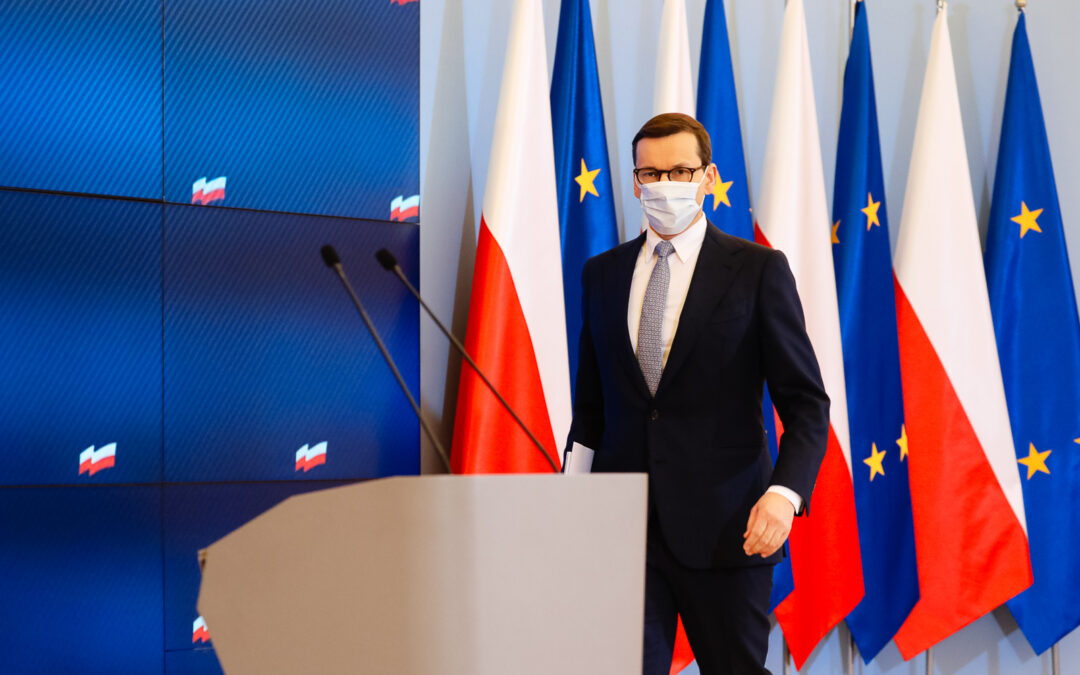In response to reports that the phones of opposition figures were hacked – and allegations that this was done for political reasons by the government – the prime minister has warned people against being drawn into a “spiral of fake news”.
He suggested that, even if the surveillance did take place, it could have been conducted by foreign agencies. One of the hacking victims has, however, ridiculed that idea, noting that text messages taken from his phone were leaked to and published by Polish state media .
Last week, Associated Press revealed that Krzysztof Brejza, a senator from the Civic Platform (PO) party, was hacked 33 times with Pegasus spyware while running the opposition’s election campaign in 2019. An opposition lawyer and a prosecutor critical of the government’s judicial reforms were also hacked.
Opposition figures have claimed that the information obtained was used to benefit the successful re-election campaign of the ruling Law and Justice (PiS) party, and have called for a full enquiry.
Speaking at a press conference yesterday, however, the prime minister, Mateusz Morawiecki, called on media outlets to exercise “healthy doubts” about the information. He accused them of propagating unverified information.
“It is typical of some media outlets that they create a false fact…and then suddenly everyone assumes that that was the reality,” said Morawiecki, quoted by TVP Info. “Well, there was no such reality. Let’s not go into a spiral of fake news.”
On the phone hacking of Polish opposition politician @KrzysztofBrejza [THREAD]: The Pegasus hacking intensified just before 2019 elections, when Brejza led his party's campaign, and then stopped – circumstantially pointing to motive for PiS-controlled Polish security services. 1/
— Stanley Bill (@StanleySBill) December 29, 2021
The prime minister noted that the Polish security services have already rejected claims that they have ever surveilled anyone for political purposes. He said he would ask for a further “appropriate” statement in the coming days if the media “needed” one.
“Even if there were some irregularities, there are many [security] services in the world and we cannot conclude, based on what we know from one news agency, that these people were the victims of the Polish services,” said Morawiecki.
“We may be dealing with the activity of very different services,” added the prime minister, who said he believed that the “relevant authorities” in Poland would “clarify this issue” in due course. “Countries that are not entirely friendly towards Poland act ruthlessly all the time.”
The prime minister’s remarks were, however, immediately rejected by Brejza, who noted that his messages were leaked to Polish state television, which is used as a mouthpiece by the government. He also repeated accusations that the information taken from his phone was used to help PiS’s election campaign.
“I wasn’t being surveilled by the [security] services of Jamaica or Congo,” tweeted Brejza.
Associated Press’s reports were based on research conducted by Citizen Lab, a cybersecurity watchdog based at the University of Toronto. They found a pattern of hacking of phones belonging to Brejza during the period he was running PO’s election campaign in 2019.
NIE inwigilowały mnie służby Jamajki, czy Kongo.
Źródło wysypała telewizja rządowa.
Dane 24 godzinnego monitoringu telefonu szły w kampanii do ludzi PiS – harmonogram ataków pokrywa się z kampanią.
NSO zapewniała ich wtedy, że sprawa nie wyjdzie. Ale technika poszła do przodu🤦♂️— Krzysztof Brejza (@KrzysztofBrejza) December 29, 2021
In that same year, evidence emerged indicating that Poland’s government had purchased Pegasus from its Israeli producer, NSO Group. That has never been either confirmed or denied by the government.
Pegasus spyware allows those using it to access messages, photos and other information from the target’s phone, and even to turn on their camera remotely.
Evidence indicates that it has been used by a range of countries – including Saudi Arabia and Hungary – to spy on activists, journalists, lawyers and politicians.
Spyware sold to authoritarian regimes used to target activists, politicians and journalists | #Pegasushttps://t.co/Zj7KkJrIyu
— WikiLeaks (@wikileaks) July 18, 2021
Main image credit: Krystian Maj/KPRM (under CC BY-NC-ND 2.0)

Maria Wilczek is deputy editor of Notes from Poland. She is a regular writer for The Times, The Economist and Al Jazeera English, and has also featured in Foreign Policy, Politico Europe, The Spectator and Gazeta Wyborcza.




















